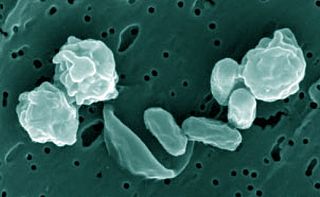Lysinibacillus sphaericus is a Gram-positive, mesophilic, rod-shaped bacterium commonly found on soil. It can form resistant endospores that are tolerant to high temperatures, chemicals and ultraviolet light and can remain viable for long periods of time. It is of particular interest to the World Health Organization due to the larvicide effect of some strains against two mosquito genera, more effective than Bacillus thuringiensis, frequently used as a biological pest control. L. sphaericus cells in a vegetative state are also effective against Aedes aegypti larvae, an important vector of yellow fever and dengue viruses.

Bacillus odysseyi is a Gram-positive, aerobic, rod-shaped, round-spore- and endospore-forming eubacterium of the genus Bacillus. This novel species was discovered by scientist Myron T. La Duc of NASA’s Biotechnology and Planetary Protection Group, a unit whose purpose is to clean and sterilize spacecraft so as not to have microorganisms contaminate other celestial bodies or foreign microorganisms contaminate Earth, on the surface of the Mars Odyssey in a clean room at the Jet Propulsion Laboratory in La Cañada Flintridge before the spacecraft was launched to space. La Duc named the bacterium Bacillus odysseyi sp. nov. after the Odyssey mission. It had apparently evolved to live in the sparse environment of a clean room, and its secondary spore coat makes it especially resistant to radiation.
Lysinibacillus fusiformis is a gram-positive, rod-shaped bacterium of the genus Lysinibacillus. Scientists have yet to completely characterize this microbe's pathogenic nature. Though little is known about this organism, several genome sequencing projects for various strains of L. fusiformis are currently underway.
Lysinibacillus boronitolerans is a spore-forming, Gram-positive, motile, rod-shaped and boron-tolerant bacterium with type strain 10aT.

Orcinus meyeri is a fossil species of Orcinus found in the Early Miocene deposits of southern Germany, known from two jaw fragments and 18 isolated teeth. It was originally described as Delphinus acutidens in 1859, but reclassified in 1873. Its validity is disputed, and it may be a synonymous with the ancient sperm whale Physeterula dubusi. It was found in the Alpine town of Stockach in the Molasse basin, which was a coastal area with strong tidal currents.
Lysinibacillus alkalisoli is a Gram-positive, aerobic and motile bacterium from the genus of Lysinibacillus which has been isolated from saline-alkaline soil from Hanggin Banner.
Lysinibacillus antri is a Gram-positive, rod-shaped, endospore-forming and motile bacterium from the genus of Lysinibacillus which has been isolade from soil from a karst cave in Xingyi county.
Lysinibacillus cavernae is a Gram-positive, rod-shaped and motile bacterium from the genus of Lysinibacillus which has been isolated from soil from a karst cave in Libo County.
Lysinibacillus composti is a Gram-positive, rod-shaped, endospore-forming and motile bacterium from the genus of Lysinibacillus which has been isolated from compost.
Lysinibacillus contaminans is a Gram-positive, aerobic and endospore-forming bacterium from the genus of Lysinibacillus which has been isolated from surface water.
Lysinibacillus cresolivorans is a Gram-positive, facultatively anaerobic, rod-shaped and endospore-forming bacterium from the genus of Lysinibacillus.
Lysinibacillus endophyticus is a Gram-positive, aerobic and rod-shaped bacterium from the genus of Lysinibacillus which has been isolated from the root of a maize plant. Lysinibacillus endophyticus produces indole-3-acetic acid.
Lysinibacillus halotolerans is a Gram-positive, aerobic, halotolerant, endospore-forming and rod-shaped bacterium from the genus of Lysinibacillus which has been isolated from saline-alkaline soil from Lingxian County.
Lysinibacillus louembei is a Gram-positive, aerobic, rod-shaped and motile bacterium from the genus of Lysinibacillus.
Lysinibacillus parviboronicapiens is a Gram-positive, rod-shaped, spore-forming and motile bacterium from the genus of Lysinibacillus which has been isolated from soil.
Lysinibacillus tabacifolii is a Gram-positive, strictly aerobic and endospore-forming bacterium from the genus of Lysinibacillus which has been isolated from leaves of the plant Nicotiana tabacum.
Lysinibacillus telephonicus is a Gram-positive, aerobic, rod-shaped, endospore-forming and motile bacterium from the genus of Lysinibacillus which has been isolated from the screen of a cellular phone.
Lysinibacillus timonensis is a bacterium from the genus of Lysinibacillus which has been isolated from human skin.
Lysinibacillus xylanilyticus is a Gram-positive, aerobic, xylan-degrading, endospore-forming and motile bacterium from the genus of Lysinibacillus which has been isolated from forest humus from the Gyeryong Mountain.
Lysinibacillus yapensis is a Gram-positive, aerobic, spore-forming and motile bacterium from the genus of Lysinibacillus which has been isolated from deep-sea sediments from the Yap Trench.

